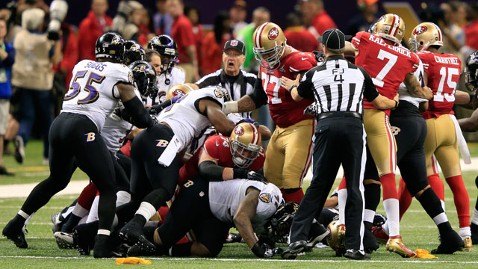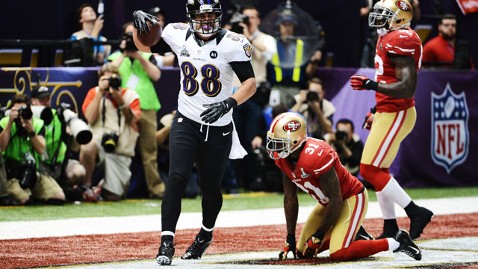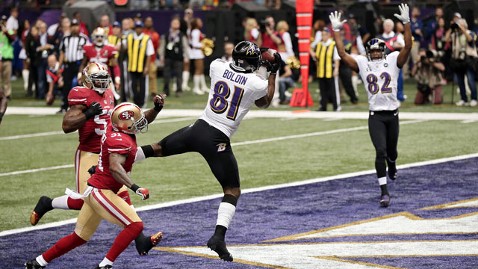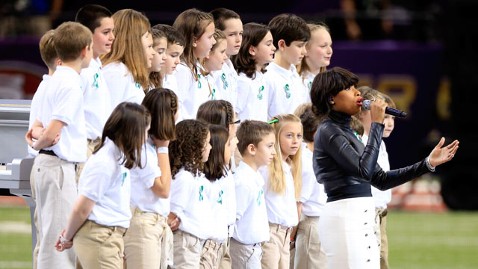8:00 p.m. ET: First half ends with a Ray Lewis sack. The likely future Hall of Famer is retiring after this game. Strangely enough, his first NFL sack was of Jim Harbaugh – who is currently coaching the 49ers. Also in that game? Randy Moss, who is currently having a rough game for the 49ers.
7:59 p.m. ET: Field goal is Good. 21-6 Ravens at the half.
7:58 p.m. ET: Really looks like the big game jitters are getting to Kaepernick. Ray Lewis sack brings out Akers for a field goal attempt.
7:55 p.m. ET: Fun Fact – Kaepernick was drafted by the Chicago Cubs as a pitcher in 2009. You can see the pitcher still in him with some of these throws.
7:54 p.m. ET: 49ers back in the red zone after a few big gains. They still have two timeouts with less than one minute left in the second quarter.
7:52 p.m. ET: 15-yard penalty and automatic first down for the 49ers on a roughing the passer call.
7:50 p.m. ET: That’s Flacco’s 11th touchdown pass this postseason.
7:49 p.m. ET: 21 – 3 Baltimore as incredible throw, catch and run lead to a touchdown for the Ravens. 49ers have A LOT of work to do in the second half.
7:48 p.m. ET: TOUCHDOWN RAVENS.
7:45 p.m. ET: No flag on what looked like offensive pass interference as Culliver breaks up a Flacco long throw, and we hit the two-minute warning.
7:44 p.m. ET: 2nd and 10 for the Ravens with 2 minutes left in the second quarter. The Ravens will be receiving the ball at the beginning of the second half.
7:41 p.m. ET: Kaepernick, who had been noted for his great decision making calls under pressure, is having a rough game so far. At 25 years old, this start is only the tenth pro start of his career.
7:39 p.m. ET: Awesome 9-year-old girl football player Sam Gordon is in the house!
7:37 p.m. ET: Volkswagen’s controversial ad just aired – here’s Jamaica’s reaction to it.

Harry How/Getty Images
7:37 p.m. ET: Gutsy fake field goal call considering the Ravens’ rookie kicker is about as sure a thing as there is for points.
7:36 p.m. ET: Tricky – fake field goal by the Ravens, but short of a first down.
7:34 p.m. ET: Almost an interception by the Niners, but it’s just an incomplete pass by Flacco. 3rd and 9.
7:31 p.m. ET: Another first down for the Ravens.
7:30 p.m. ET: Personal fouls by both teams cancel each other out. Ravens first down at 49ers 38.
7:29 p.m. ET: That interception is evidently the first time a 49ers quarterback has ever been intercepted in the Super Bowl (that’s five previous games). And Reed ties the record with his 9th postseason interception.

Jamie Squire/Getty Images
7:28 p.m. ET: Interception by Baltimore but flag is down and teams fighting on the field.
7:24 p.m. ET: After that commercial about sports fans’ superstitions – here’s an interesting article about when those superstitions cross the line into OCD.
7:22 p.m. ET: Penalties and that fumble killing San Francisco so far. 14-3 Ravens. Ten touchdowns and no interceptions so far this postseason for Flacco.

Harry How/Getty Images
7:22 p.m. ET: TOUCHDOWN BALTIMORE.
7:21 p.m. ET: Automatic first and goal for Ravens after another penalty – a personal foul on 49ers’ Whitner.
7:20 p.m. ET: Flacco connects with Dickson, and a flag is down.
7:19 p.m. ET: While they’re on the subject of Patrick Willis, here’s an interesting story about him and his “brother for life,” the Baltimore’s Michael Oher.
7:17 p.m. ET: Another first down for the Ravens. That’s 4/5 third down conversions for the Ravens so far.
7:16 p.m. ET: Major change of momentum, as Ravens get gain of about 5 after 49ers fumble.
7:12 p.m. ET: Fumble recovered by Ravens. First down for Baltimore.
7:12 p.m. ET: Another first down for the Niners.
7:11 p.m. ET: Another first down on gain of eleven with reception by Davis. Another another small scuffle breaks out. Teams clearly (obviously) passionate.
7:10 p.m. ET: Looks like Davis is okay – gain of 29 yards on great throw from Kaepernick.
7:08 p.m. ET: First Harbaugh parent sightings of the night! They’ve said tonight will be really bittersweet for them.
7:08 p.m. ET: They may be brothers, but side-by-side comparison of the Harbaugh brothers’ reactions to last play show totally different styles.
7:05 p.m. ET: Flacco sacked with 12 seconds left in quarter.
7:04 p.m. ET: Incomplete throw by Flacco with 17 seconds left in the 1st quarter.
7:03 p.m. ET: Unbelievable throw and catch by Boldin for 31-yards.
7:02 p.m. ET: 3rd and 7 for Ravens after incomplete pass by Flacco.
7:00 p.m. ET: 9-yard gain for the Ravens. Ed Reed in locker room for evaluation.
6:57 p.m. ET: Jacoby Jones returns kick to the 22-yard line. Ravens’ Ed Reed and 49ers’ Vernon Davis both apparently being checked out after Reed hit Davis on previous drive.

Harry How/Getty Images
6:55 p.m. ET: And to the relief of 49ers fans, David Akers field goal attempt is good. 7-3 Ravens.
6:54 p.m. ET: Kaepernick sacked. 49ers going for field goal.
6:53 p.m. ET: Davis out and being worked on by trainers. Second and goal, incomplete in the end zone, off of Crabtree’s hands.
6:52 p.m. ET: Vernon Davis, a super speedy tight end, with another first down on a 24-yard reception from Kaepernick. 1st and goal.
6:51 p.m. ET: And Gore with another first down.
6:50 p.m. ET: Kaepernick scrambles for a gain of seven, 2nd and 3.
6:50 p.m. ET: Kaepernick, who shocked the league with his legs when he took over from Alex Smith, gets a 1st down and then some.
6:49 p.m. ET: Gore gains nine, after having a rough few carries early.
6:48 p.m. ET: Huge, 19-yard game for Michael Crabtree, who broke out this season once Kaepernick took over the starting QB job.
6:46 p.m. ET: Already looking to be a really physical game as scuffle between players breaks out after 49ers loss of two yards.
6:45 p.m. ET: And here’s the GoDaddy commercial everybody has already been talking about – supermodel makes out with Hollywood’s favorite extra.
6:44 p.m. ET: Penalties already hurting the 49ers – big game jitters?

McNamee/Getty Images
6:41 p.m. ET: And the extra point is good. 7-0 Ravens
6:40 p.m. ET: TOUCHDOWN BALTIMORE. Ravens take an early lead with a reception by Anquan Boldin.
6:39 p.m. ET: On 3rd and 9, same thing happens, but flag is down for defensive offsides – five yard penalty and replay of 3rd down.
6:39 p.m. ET: Given some time, Flacco throws ball beyond end zone for an incompletion on 2nd and 9.
6:38 p.m. ET: Ravens QB, Joe Flacco, known for his exceptionally strong arm, gets the ball to Torrey Jones at the SF 19.
6:37 p.m. ET: And a first down for the Ravens from SF 39.
6:36 p.m. ET: Better start for the Ravens, who pick up eight yards on their first down of the game.
6:36 p.m. ET: And the first drive of the game goes nowhere; Andy Lee punts on 4th down, and Jacoby Jones returns to near the 50-yard line.
6:34 p.m. ET: On first and 15, no gain for 49ers all-time leading rusher, Frank Gore.
6:33 p.m. ET: Five yard penalty for the 49ers for illegal formation.
6:32 p.m. ET: Kaepernick connects with Vernon Davis for a gain of 20, but a flag is down.
6:31 p.m. ET: Here we go – 49ers start the first drive at the 20-yard line.
6:28 p.m. ET: Ravens chose heads, and elected to defer their choice until the second half. 49ers to receive at kickoff.
6:27 p.m. ET: Newest members of the Pro Football Hall of Fame join the team captains for the coin toss.
6:22 p.m. ET: Alicia Keys performs the Star Spangled Banner, wearing a red dress and playing a white piano at the 50-yard line.
6:21 p.m. ET: Joint Armed Forces Color Guard present the flags.
6:20 p.m. ET: Hudson wearing a green ribbon in honor of the victims of the Sandy Hook school shooting while performing with the students.

Jamie Squire/Getty Images
6:19 p.m. ET: In a touching performance, Sandy Hook Elementary School students perform “America the Beautiful,” with Jennifer Hudson.
6:18 p.m. ET: Jason Witten wins the 2012 Walter Payton NFL Man of the Year Award.
6:12 p.m. ET: And out come the 49ers.
6:11 p.m. ET: The Ravens players are introduced in the stadium to a raucous crowd.
6:09 p.m. ET: And another historic first tonight – the two head coaches are brothers, born just 15 months apart. John Harbaugh, 50, is in his fifth season as the Baltimore Ravens head coach, and has won playoff games in each of his previous seasons. Jim Harbaugh, 49, is in his second season as head coach of the San Francisco 49ers, leading his team to the playoffs both seasons.
6:05 p.m. ET: The San Francisco 49ers are going for their 6th Lombardi trophy, which would tie them for the most championships ever with the Pittsburgh Steelers. The Baltimore Ravens are trying for their second Super Bowl victory. Neither team has ever lost a Super Bowl game – and at the end of the night, there will only be one team left in the NFL to have never lost a Super Bowl game.
6:00 p.m. ET: It’s here – the biggest spectacle in American sports, the Super Bowl. We’ll be covering the game, performances and, of course, the commercials right here.
It’s been an incredible season so far, and everything has led up to tonight’s game in New Orleans, where the NFC Champion San Francisco 49ers face the AFC Champion Baltimore Ravens in Super Bowl XLVII. Keep refreshing for the latest updates throughout what promises to be a great game.



















